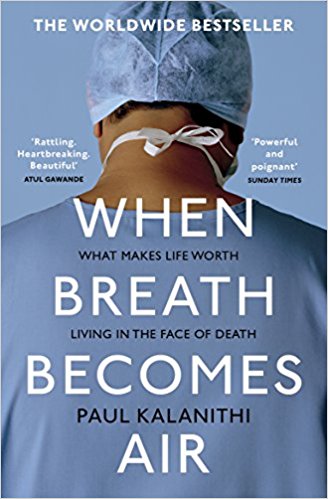When Breath Becomes Air Book Review
Preparing to leave for a short vacation, my parents told me to pick out two books while we were at a bookstore. After looking throughout the store, I decided that anything positive could not be selected. So I chose a book on the Nuremberg Trials and “When Breath becomes Air” by Paul Kalanithi. The latter was, while less grim than the first, powerful in its description of the unusual situation Kalanithi was forced into as a medical doctor. He was nearing completion of his neurosurgery residency only when given a terminal cancer diagnosis.
While some people like to turn to the last page of the book to see how a story ends, for this novel that would be unnecessary because the reader knows the author’s fate on the first page. In the prologue Kalanithi accepts that his future, the “one just about to be realized, the culmination of decades of striving, evaporated.” From the point that he has little time left to live, he puts his focus upon the life that he has had and the process of being put in a patient’s position as a person who previously took care patients.
Kalanithi was married at the time that he was diagnosed to another doctor who was also finishing her residency. Despite the fact that his death was imminent, they decided to have a child. I found their decision to be thought-provoking move dealing with Kalanithi’s upcoming morality, they decided to have a child who would not grow up with a father. Kalanithi felt that “a child would bring joy to the whole family,” and he “couldn’t bare to picture Lucy husbandless and childless” after he died. Kalanithi recognizes the enormity of this prospect and gives his wife the final decision of whether they should become parents. In addition, the child would be be an extension of him in the life of his soon-to-be widow, Lucy.
One aspect of this novel I enjoyed was Kalanithi’s rich family relations that he speaks of throughout the book. Along with his wife, who was a main character, the presence of his parents, doctors, friends, and relatives also becomes relevant. From the beginning, the reader learns about Kalanithi’s family life and how they affect his slow decision process to become a doctor, one of many doctors in his family. Toward the end of his life when he has to endure many long treatments, his parents are at his bedside or in his home caring from him and his young family.
“When Breath Becomes Air” turned out to be an excellent read during my family vacation. The book was eventually read by other family members. The conflict of the book created an introspect of how to handle a grave sentence when every other aspect of one’s life is focused on success and accomplishment. Kalanithi’s writing makes the reader stop and wonder and reflect on the meaning of their pursuit of happiness and career climb, and that there are no guarantees of reaching the intended goals.
Your donation will support the student journalists of Bellaire High School. Your contribution will allow us to purchase equipment and cover our annual website hosting costs.







